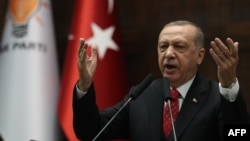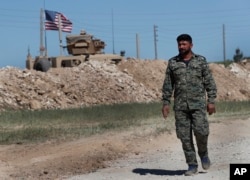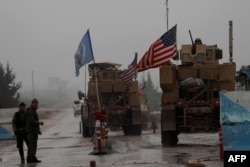Turkish President Recep Tayyip Erdogan says he has not yet seen an acceptable plan for the creation in Syria of a safe zone aimed at protecting Turkey's border from attack.
Erdogan spoke Tuesday at a parliamentary meeting of his ruling AKP, saying, "There is no satisfactory plan that is put before us concretely yet. He also said, "Of course we are loyal to our agreements, our promise is a promise. However, our patience is not limitless.” Erdogan spoke as his foreign minister, Mevlut Cavusoglu, was visiting the United States for talks with Secretary of State Mike Pompeo and other senior diplomats. The two-day discussions were expected to focus on U.S. President Donald Trump’s recent proposal to create the zone to protect Turkey from the YPG, a Syrian Kurdish militia.
Washington’s support of the YPG in the war against Islamic State angers Ankara, which considers the militia terrorists linked to a decades-long Kurdish insurgency inside Turkey. Turkish-U.S. tensions have been eased by Trump’s decision in December to withdraw all U.S. forces from Syria. Erdogan, however, is voicing growing frustration about a perceived lack of clarity on when U.S. forces will withdraw and how and when the zone is implemented.
The talks this week are part of a process initiated last year by then-secretary of state Rex Tillerson to ease bilateral tensions over Syria. Erdogan on Sunday warned that Turkish forces massed on the Syrian border were ready to intervene unilaterally. In the past 18 months, Ankara has launched two military operations into Syria against the YPG, securing a large swathe of Syrian territory.
Signs of Trump backsliding?
Analysts suggest Ankara’s hardening rhetoric is an indication of concern that Trump is starting to backslide on his Syrian withdrawal commitment. The U.S. president faces intense domestic criticism along with accusations the U.S. is abandoning Kurdish fighters.
“Americans won't leave the area without any concrete protection plan or safe haven for the Kurds,“ said international relations professor Huseyin Bagci of Ankara’s Middle East Technical University.
“There is the option for the U.S. to withdraw its land presence but to extend a protection umbrella with some sort of no-fly zone,” said former Turkish diplomat Aydin Selcen.
“Some sort of aerial protection can be declared,” he added, “That's why (Russian President Vladimir) Putin was so cautious when he said we have to wait and see whether the U.S. will be out of Syria. We have to see whether it’s just a change in the presence in Syria, rather than a complete withdrawal.”
Turkish and U.S. diplomats were also expected to address the thorny issue of who would control and administer the proposed 32- kilometer-deep safe zone.
Erdogan on Tuesday reiterated his demand for the zone to be under Turkish control and supported logistically by “international allies.” The YPG rejects such a demand, warning it would resist militarily.
Ankara has indicated the safe zone would follow the lines of previous Syrian military operations against the YPG, relying heavily on elements of the Turkey-backed Free Syrian Army, or FSA, a coalition of militias fighting the Damascus government. Analyst Atilla Yesilada of Global Source Partners warns such a move is contentious.
“The FSA, these guys are vandals; no one knows who these guys are. A few days ago, they were part of (al-Qaida-affiliated) al-Nusra, and trusting the security of the mainly Kurdish population and even Christians would be a disaster,” he said.
US seeking allies for safe zone control
According to reports, Washington has been seeking international allies to control the safe zone, but unsuccessfully.
Ankara is also looking to other allies for a solution. Turkish presidential spokesman Ibrahim Kalin on Monday said talks would resume with Russia on the creation of the zone. Erdogan is due to meet Putin later this month.
Erdogan also confirmed that talks on an intelligence level were continuing with Damascus. Ankara severed its diplomatic relations with the Syrian government at the start of the civil war. The Syrian government, however, could yet offer a solution to the current impasse.
“Ankara will be happy with a situation where Damascus' authority is extended to the Turkish frontier,” while “replacing the local YPG authority along the frontier,” he said.
The YPG started talks with Damascus last month in a move seen as preventing a Turkish military operation.
U.S.-Turkish diplomatic talks in Washington were also expected to focus on the future of the Syrian city of Manbij. U.S.-backed forces composed mainly of the YPG seized the strategically important city in 2016 from Islamic State.
During a visit to Ankara in 2016, then-U.S. Vice President Joe Biden promised the Kurdish militia would withdraw from Manbij after its capture. The ongoing presence of YPG in the city is another point of tension in Turkish-U.S. relations.
Ankara’s anger is exacerbated by what it claims is the slow progress of an agreed upon U.S.-Turkish road map to hand over Manbij to Turkish-backed Syrian forces.
"If the terrorists do not leave Manbij in a few weeks, then our patience will end. The United States must keep Turkey's data on Syria's promises. Otherwise, Ankara itself will take steps to eliminate the threats to national security," Erdogan said Tuesday.
Currently, the Turkish, U.S. and Russian military forces are deployed in and around Manbij. Analysts, however, say time may now be against Washington, given Trump’s commitment to leave Syria.
“All the other actors, Turkey, Iran, Russia, Syria, have the time to wait the U.S. out,” said Selcen.






